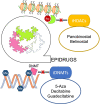Epigenetic remodelling in human hepatocellular carcinoma
- PMID: 35331312
- PMCID: PMC8943959
- DOI: 10.1186/s13046-022-02297-2
Epigenetic remodelling in human hepatocellular carcinoma
Abstract
Hepatocellular carcinoma (HCC) is the most frequent primary liver cancer, being the sixth most commonly diagnosed cancer and the fourth leading cause of cancer-related death. As other heterogeneous solid tumours, HCC results from a unique synergistic combination of genetic alterations mixed with epigenetic modifications.In HCC the patterns and frequencies of somatic variations change depending on the nearby chromatin. On the other hand, epigenetic alterations often induce genomic instability prone to mutations. Epigenetics refers to heritable states of gene expression without alteration to the DNA sequence itself and, unlike genetic changes, the epigenetic modifications are reversible and affect gene expression more extensively than genetic changes. Thus, studies of epigenetic regulation and the involved molecular machinery are greatly contributing to the understanding of the mechanisms that underline HCC onset and heterogeneity. Moreover, this knowledge may help to identify biomarkers for HCC diagnosis and prognosis, as well as future new targets for more efficacious therapeutic approaches.In this comprehensive review we will discuss the state-of-the-art knowledge about the epigenetic landscape in hepatocarcinogenesis, including evidence on the diagnostic and prognostic role of non-coding RNAs, modifications occurring at the chromatin level, and their role in the era of precision medicine.Apart from other better-known risk factors that predispose to the development of HCC, characterization of the epigenetic remodelling that occurs during hepatocarcinogenesis could open the way to the identification of personalized biomarkers. It may also enable a more accurate diagnosis and stratification of patients, and the discovery of new targets for more efficient therapeutic approaches.
Keywords: Epidrugs; Epigenetics; HCC; Histone modifications; Methylation; Non-coding RNAs.
© 2022. The Author(s).
Conflict of interest statement
The authors declare that they have no competing interests.
Figures



References
-
- Bray F, Ferlay J, Soerjomataram I, Siegel RL, Torre LA, Jemal A. Global cancer statistics 2018: GLOBOCAN estimates of incidence and mortality worldwide for 36 cancers in 185 countries. CA Cancer J Clin. 2018;68:394–424. - PubMed
-
- Llovet JM, Zucman-Rossi J, Pikarsky E, Sangro B, Schwartz M, Sherman M, et al. Hepatocellular carcinoma. Nat Rev Dis Prim. 2016;2:16018. - PubMed
-
- Villanueva A. Hepatocellular Carcinoma. N Engl J Med. 2019;380:1450–1462. - PubMed
-
- Bellentani S. The epidemiology of non-alcoholic fatty liver disease. Liver Int. 2017;37:81–84. - PubMed
Publication types
MeSH terms
Grants and funding
LinkOut - more resources
Full Text Sources
Medical
Research Materials

